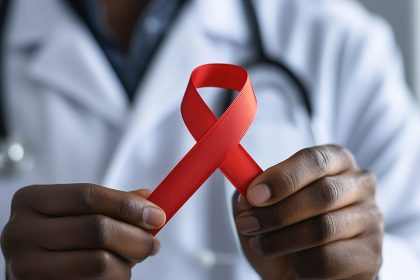Kenyans suffer from ‘Headline Anxiety’ and result to ‘Doomscrolling’ or continually scrolling through upsetting news while struggling with growing anxiety- Davis Achuti, psychologist
Kenya seems to be simmering with anger—whether it’s road rage, heated social media exchanges or a general rise in indiscipline and borderline rudeness. Behavioural scientists say this pervasive anger is fuelled by, among others, a steady diet of negative news.

It is called ‘Headline Anxiety’. Basically, being mentally exhausted and emotionally overburdened by constant exposure to alarming or negative news- From political scandals, economic woes, Gen-Z protests, femicide and other crimes and public unrest- all create social angst, mental anxiety, a sense of hopelessness, and an ‘angry nation.’
The relentless cycle of bad news, experts warn, may be eroding the nation’s emotional resilience, pushing everyday tempers to the edge.
Never mind that Kenya was ranked the “most optimistic country in the world” in 2003 by Gallup International based on a global poll that measured perceptions of optimism and pessimism about the future.
That is hardly the case today, with a constant stream of negative news playing a prominent role.
Read Also: What’s behind the growing frustration in Kenya?
According to the 2024 Reuters Institute Digital News Report, Kenya’s internet penetration stands at 85 per cent. What’s more? About 94 per cent of news is consumed via smartphones, with social media accounting for 77 per cent in the consumption of information.
That prioritization of news starts with attention-grabbing and sometimes sensationalized headlines only worsens ‘Headline Anxiety.’
Several prominent Kenyans- who are often the newsmakers- have stepped away from news and social media altogether. Like Senior Counsel Paul Muite, the former Kikuyu MP who obsessively avoids media interviews and only occasionally emerges to correct misinformation about himself on social media.
Intense media coverage and social media fueled fire that led to her exit
But Muite recently crawled out of the woodwork and was among lawyers representing former Deputy President Rigathi Gachagua in his impeachment battle.
Then there is Nancy Barasa, the first Deputy Chief Justice of Kenya’s Supreme Court, who was accused of pinching the nose of Rebecca Kerubo, a security guard at the Village Market and threatening her with a gun in 2011.
Barasa—now a university lecturer— resigned in August 2012 and has largely withdrawn from the public eye, appearing only once in 2015 on KTN, where she attributed her retreat to the intense media coverage, with Kenyans on X, fuelling the fire that led to her exit.

Even President Uhuru Kenyatta was not spared and was forced to disable his social media accounts, including X, which had 3.6 million followers on March 22, 2019, arguing “it was unhelpful” as it was “filled with insults. “You end up spending sleepless nights doom-scrolling. I’d rather have a conversation with my wife.”
Uhuru recently told Kenyans in Embu County that he has been detoxing away from politics and ‘rarely watches news’ to maintain his sanity.
Chief Justice Martha Koome also disabled the comment section on her social media accounts following backlash on myriad issues, including rulings on presidential petitions.
The average Kenyan who consumes negative news fares even worse if the country’s position in the 2024 World Happiness Report is any yardstick.
Kenya is ranked 114th out of 143 countries—making it the 29th least happy nation globally. This marks a notable slide from its 2023 rank of 111th.
Interestingly, the report reveals that joy in Kenya skews heavily by age, with young people emerging as the happiest demographic while upper middle-aged individuals report the least happiness.
Read Also: https://willowhealthmedia.org/just-what-the-doctor-ordered/
Allan Odhiambo, a sociologist based in Homabay, fears that growing resentment won’t fade anytime soon, as negative news stalks the economy, health, and education sectors—which directly impact the daily lives of Kenyans.
Odhiambo says negative news on “the shilling’s struggle against the dollar, rising taxes, Social Health Authority (SHA) issues, misunderstandings surrounding the Competency-Based Curriculum (CBC), or delayed disbursements to schools, including universities” can jeopardize mental well-being.
Davis Achuti, a psychologist, warns that the worst thing about Headline Anxiety is that “you won’t notice when getting into it”, and this is aggravated as social media algorithms can personalize content, reinforcing a negative cycle by constantly exposing users to distressing material.
Negative news aggravates depression, burnout, anger, endless worrying, hypertension, diabetes
Achuti adds that the key driver of ‘Headline Anxiety’ is the psychological impact of ‘doomscrolling’ where people continually scroll through upsetting news stories, struggling to look away even as their anxiety grows.

Achuti notes that ‘Headline Anxiety’ can trigger physical symptoms like rapid heartbeat, shallow breathing, an upset stomach, and the resurfacing of traumatic memories, leading to feelings of despair and hopelessness.
Negative news also aggravates depression, burnout, anger, endless worrying, hypertension, and diabetes and leads to low productivity.
It also wastes valuable time, intensifying the emotional toll and leading to addiction to substance abuse as part of self-medication. Key warning signs include persistent negative thoughts, ongoing anger, feelings of resentment, and a noticeable loss of interest in other activities. In some cases, individuals may go through stages of denial, anger, and bargaining, struggling to break free from the cycle of distress.
Headline anxiety affects men and women differently. Psychologist Eve Ariwo notes that women are more likely to experience headline anxiety than men as “they tend to be more emotional” as they’re generally more empathetic and sensitive to societal issues.
Men, on the other hand, may internalize stress differently, often manifesting as frustration or withdrawal rather than outward expressions of anxiety.
The impact of ‘Headline Anxiety’ also depends on educational levels and socioeconomic status with varying effect on urbanites and rural populations.
Kenyans with limited education lack resources to recognize headline anxiety
According to various research on Media Psychology journal, people with higher education levels may better discern credible sources from sensationalized news, mitigating anxiety. However, they may also be more exposed to news due to their professions or personal interests, leading to heightened awareness and stress.
Kenyans with limited education are vulnerable as they lack resources to recognize or manage headline anxiety and most times “they don’t even realize they’re being affected until they’re already victims,” explains Ariwo, adding that those in rural areas, who have less exposure to headline news due to lower mobile penetration, are less likely to suffer headline anxiety compared to urban dwellers whose lives are heavily intertwined with digital gadgets.

But urbanites, says Ariwo, cope better as they “tend to be more aware of mental health issues and are quickly responding by seeking psychological sessions from mental health facilities. This helps them counter challenges like headline anxiety more effectively compared to those in rural areas, where such resources are scarce”.
Media Psychology journal also notes that the wealthy are stressed by how economic or political instability impacts their investments and assets.
However, Ariwo explains that the well-off “raised in environments where guidance and counselling were part of their upbringing are better equipped to detect and address psychological issues like headline anxiety. This gives them an advantage over those from poorer backgrounds.”
Headline anxiety has an effect on underlying health conditions, and Psychology Today notes that it can mentally worsen the severity of disorders like depression, generalized anxiety disorder (GAD) and post-traumatic stress disorder (PTSD).
There is need to regulate or disconnect from media platforms to stay with people who create positive energy like family
Physically, alarming news before bedtime often disrupts sleep, leading to insomnia. Prolonged stress associated with negative news can also elevate cortisol levels, increasing the risk of cardiovascular issues like hypertension and heart disease. It can worsen gastrointestinal conditions like irritable bowel syndrome (IBS) and acid reflux besides suppressing the immune system, making individuals more vulnerable to illnesses.
But what to do?
Achuti says there is a need to “regulate or disconnect from media platforms to stay with people who create positive energy like family.”
Odhiambo suggests setting boundaries on news consumption or adopting healthier habits that minimize exposure to distressing headlines. He also advises people to “avoid sensational stories—especially when you wake up or just before going to sleep,” besides setting timers to prevent excessive doom scrolling, which can be addictive besides turning to credible news sources that prioritize balanced information over attention-grabbing headlines.
“If you’re caught in a cycle of anxiety, simple measures like deep breathing or meditation can provide immediate stress relief and help manage anxious thoughts,” he adds. “For myself, I unplug entirely on Sundays—taking a complete break from screens after a week of constant interaction—to refresh and refocus.”
Seeking help from a therapist or counsellor might be necessary, especially if the headlines start to interfere with daily life adds Odhiambo.
At the Kenya Association of Professional Counsellors (KAPC), costs range from Ksh3,000 to Ksh6,000, depending on the counsellor’s experience and the complexity of the issue. Group therapy costs between Ksh1,500 and Ksh3,500 per participant.
Others include Amani Counselling Centre, Chiromo Hospital Group and Nairobi Counselling Services all with varying session fees for even specialized support like trauma therapy depending on location, expertise, and the therapist’s reputation.
Shaban Makokha, a resident of Mumias Town and a self-confessed victim of headline anxiety, says he can hardly afford therapy sessions. He thus avoids watching the 9 pm news and opts for soap operas to “keep my brain calm and focused from the injuries of negative news. I also scroll with caution, skipping and even blocking sites and topics that cause me anger.”






















